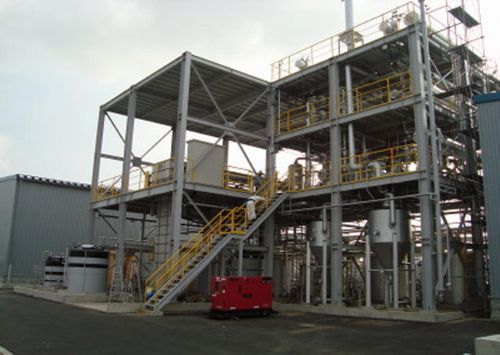January 16, 2011
Japanese Heavy Industry Company Succeeds in Producing Bioethanol for Automobile Fuel
Keywords: Manufacturing industry Renewable Energy Transportation / Mobility

Copyright Kawasaki Heavy Industries, Ltd.
Kawasaki Heavy Industries, Ltd., a leading Japanese heavy machinery manufacturer, announced on October 6, 2010, that the company successfully produced bioethanol from rice plants for use as automobile fuel by employing an advanced subcritical water-based bioethanol production technology. This effort is part of a larger national bioethanol demonstration project, an initiative by Japan's Ministry of Agriculture, Forestry and Fisheries (MAFF), to establish bioenergy technologies that utilize untapped soft cellulose biomass.
Kawasaki's new technology forgoes the use of sulfuric acid or enzymes, which conventionally have been used to saccharify cellulose, using hot-compressed water instead. The system thus helps to drive down costs by eliminating the need for a sulfuric acid recovery system and an acid-resistant chamber, or any enzymes currently being traded at high prices. The technique can also be used to saccharify soft cellulose materials other than rice straw and husk by simply altering the heated water conditions.
The company conducted verification tests at the Solar Sports Line in Oogata Village in Akita Prefecture using new bioethanol fuel produced at a test production plant in Katagami City in the same prefecture. The tests demonstrated that a flexible fuel vehicle (FFV) operated stably and that the new soft cellulose-based fuel met current automobile fuel standards.
Kawasaki will continue to conduct verification tests aimed at cutting production costs until the project ends in March 2012. Its goal is to lower the per-liter production cost to 40 yen (about 48 US cents) or less before commercializing the fuel.
Joint Research to Develop Cellulose Bio-Ethanol by 2015 (Related JFS article)
http://www.japanfs.org/en/pages/028959.html
Posted: 2011/01/16 06:00:15 AM
Reference
Kawasaki Heavy Industries, Ltd. official website
http://www.khi.co.jp/english/
Related
"JFS Newsletter"
- 'Yumekaze' Wind Turbine Project Connects Metro Consumers and Regional Producers: Seikatsu Club Consumers' Co-operative
- Shaping Japan's Energy toward 2050 Participating in the Round Table for Studying Energy Situations
- Nishiawakura's Initiative for 100% Energy Self-Sufficiency, and a Municipal ICO Scheme
- Actions Toward 100% Renewable Energy in Japan
- Sustainable Community Building in Shimokawa: Recycling-Oriented Forest Management Enabling Permanent Use of Forest Resources
Related
"Popular Articles"
- Current Status of Renewable Energy in Japan (2015)
- Offshore Wind Farm Withstands Great East Japan Earthquake and Tsunami
- Current Status of Renewable Energy in Japan (2014)
- Geothermal Power: Japan Has World's Third Largest Geothermal Reserves, 60 Percent of Which Can Be Developed
- Tokyo Plans to Increase Renewable Energy Ratio to 20% by 2024


